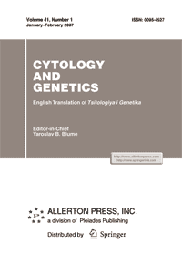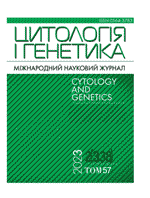РЕЗЮМЕ. У випадку колоректального раку (КРР) деактивація SMAD4 проходить на ранньому етапі розвитку захворювання і SMAD4 є одним з ключових драйверних генів його розвитку та метастазів. Втрата експресії білка SMAD4 – це досить поширена риса спорадичного колоректального раку, яка навіть частіше спостерігається в пухлинах пацієнтів з раннім розвитком захворювання, а також в пухлинах з мікросателітною стабільністю. Патогенетичні варіанти в гені SMAD4 є зазвичай міссенс чи нонсенсмутаціями, які часто трапляються в Cтермінальному домені. Мета цього дослідження полягала у проведенні генетичного аналізу SMAD4 Cтермінального домену у пацієнтів з колоректальним раком з раннім початком захворювання та пухлинами з мікросателітною стабільністю. Це пілотне дослідження було проведене з метою вивчення того, чи буде корисною така стратегія генетичного скринінгу для діагностики цієї особливої підгрупи пацієнтів з КРР. Дослідження проводили з вибраним набором зразків ДНК, виділених з пухлин пацієнтів з КРР, яким було менше 50 років на час встановлення діагнозу. Генетичний аналіз Cтермінального домену включав в себе аналіз екзонів 9, 10, 11 і 12 гену SMAD4 за допомогою ПЛР та прямого секвенування ДНК. Було виявлено, що серед двадцяти проаналізованих ДНК пухлин один зразок містив варіант SMAD4: NC_000018.9:g.48591918C>T; (NM_005359.5: c.1081C>T; Arg361Cys). Цей варіант було виявлено в екзоні 9, що впливає на кодон 361, який є гарячою точкою для мутацій всередині гену SMAD4. Варіант було виявлено в гомозиготному стані у пухлині 47-річної жінки з карциномою висхідної ободової кишки на стадії T3. Зважаючи на частоту і функціональні наслідки варіантів екзону 9 SMAD4, скринінг цієї області може бути корисною дешевою стратегією проведення генетичного аналізу пухлин колоректального раку у пацієнтів з раннім початком захворювання, а також тестування схильності до нього.
Ключові слова: колоректальний рак, ранній початок захворювання, генетичне тестування, патогенетичний варіант, SMAD4

Повний текст та додаткові матеріали
Цитована література
Bessa, X., Alenda, C., and Paya, A., et al., Validation microsatellite path score in a population-based cohort of patients with colorectal cancer, J. Clin. Oncol., 2011, vol. 29, no. 25, pp. 3374–3380. https://doi.org/10.1200/JCO.2010.34.3947
Bonfiglio, S., Vanni, I., Rossella, V., et al., Performance comparison of two commercial human whole-exome capture systems on formalin-fixed paraffin-embedded lung adenocarcinoma samples, BMC Cancer, 2016, vol. 16, art. ID 692. https://doi.org/10.1186/s12885-016-2720-4
Chang, Y.C., Chang, J.G., Liu, T.C., et al., Mutation analysis of 13 driver genes of colorectal cancer-related pathways in Taiwanese patients, World J. Gastroenterol., 2016, vol. 22, no. 7, pp. 2314–2325. https://doi.org/10.3748/wjg.v22.i7.2314
De Bosscher, K., Hill, C.S., and Nicolás, F.J., Molecular and functional consequences of Smad4 C-terminal missense mutations in colorectal tumour cells, Biochem. J., 2004, vol. 379, pp. 209–216. https://doi.org/10.1042/BJ20031886
Gallione, C.J., Repetto, G.M., Legius, E., et al., A combined syndrome of juvenile polyposis and hereditary haemorrhagic telangiectasia associated with mutations in MADH4 (SMAD4), Lancet, 2004, vol. 363, pp. 852–859. https://doi.org/10.1016/S0140-6736(04)15732-2
Gallione, C.J., Richards, J.A., Letteboer, T.G., et al., SMAD4 mutations found in unselected HHT patients, J. Med. Genet., 2006, vol. 43, no. 10, pp. 793–797. https://doi.org/10.1136/jmg.2006.041517
Houlston, R., Bevan, S., Williams, A., et al., Mutations in DPC4 (SMAD4) cause juvenile polyposis syndrome, but only account for a minority of cases, Hum. Mol. Genet., 1998, vol. 7, no. 12, pp. 1907–1912. https://doi.org/10.1093/hmg/7.12.1907
Howe, J.R., Sayed, M.G., Ahmed, A.F., et al., The prevalence of MADH4 and BMPR1A mutations in juvenile polyposis and absence of BMPR2, BMPR1B, and ACVR1 mutations, J. Med. Genet., 2004, vol. 41, pp. 484–491. https://doi.org/10.1136/jmg.2004.018598
Huang, D., Sun, W., Zhou, Y., et al., Mutations of key driver genes in colorectal cancer progression and metastasis, Cancer Metastasis Rev., 2018, vol. 37, pp. 173–187. https://doi.org/10.1007/s10555-017-9726-5
McCarthy, A.J. and Chetty, R., Smad4/DPC4, J. Clin. Pathol., 2018, vol. 71, pp. 661–664. https://doi.org/10.1136/jclinpath-2018-205095
Miyaki, M. and Kuroki, T., Role of Smad4 (DPC4) inactivation in human cancer, Biochem. Biophys. Res. Commun., 2003, vol. 306, no. 4, pp. 799–804. https://doi.org/10.1016/s0006-291x(03)01066-0
Nikolic, A., Kojic, S., Knezevic, S., et al., Structural and functional analysis of SMAD4 gene promoter in malignant pancreatic and colorectal tissues: Detection of two novel polymorphic nucleotide repeats, Cancer Epidemiol., 2011, vol. 35, no. 3, pp. 265–271. https://doi.org/10.1016/j.canep.2010.10.002
Perea, J., García-Nebreda, M., Hidalgo, M., et al., SMAD4 in early onset colorectal cancer, Colorectal. Dis., 2010, vol. 12, art. ID 948. https://doi.org/10.1111/j.1463-1318.2010.02296.x
Royce, S.G., Alsop, K., Haydon, A., et al., The role of SMAD4 in early-onset colorectal cancer, Colorectal Dis., 2010, vol. 12, no. 3, pp. 213–219. https://doi.org/10.1111/j.1463-1318.2009.01779.x
Schwenter, F., Faughnan, M.E., Gradinger, A.B., et al., Juvenile polyposis, hereditary hemorrhagic telangiectasia, and early onset colorectal cancer in patients with SMAD4 mutation, J. Gastroenterol., 2012, vol. 47, pp. 795–804. https://doi.org/10.1007/s00535-012-0545-8
Shi, Y., Hata, A., Lo, R.S., et al., A structural basis for mutational inactivation of the tumour suppressor Smad4, Nature, 1997, vol. 388, pp. 87–93. https://doi.org/10.1038/40431
Venook, A.P., Right-sided vs left-sided colorectal cancer, Clin. Adv. Hematol. Oncol., 2017, vol. 15, pp. 22–24.
Yang, G. and Yang, X., Smad4-mediated TGF-β signaling in tumorigenesis, Int. J. Biol. Sci., 2010, vol. 6, no. 1, pp. 1–8. https://doi.org/10.7150/ijbs.6.1
Zhao, M., Mishra, L., and Deng, C.X., The role of TGF-β/SMAD4 signaling in cancer, Int. J. Biol. Sci., 2018, vol. 14, pp. 111–123. https://doi.org/10.7150/ijbs.23230
